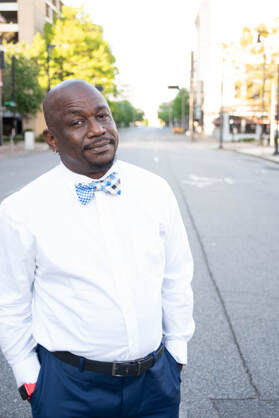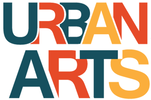 How have the arts impacted your life? The arts have been a part of my life since I was a kid. In school we would sing old folk songs and paint. My favorite art forms are music and photography. There was always music in our house. We had one of those old floor-model radios. The kind with the recessed turntable and two big speakers on each end. Music provides an escape for many of us, which is why I think music is so important to Black people. From the secret messages hidden in Negro Spirituals to Black American Anthems like Marvin Gaye’s, “What’s Going On,” music speaks to the many different aspects of our lives. My mother loved taking pictures of us with her Polaroid Instamatic. We hated those photos because she never let us prepare for the pics. It didn’t matter whether in the bathtub or just outside playing in the mud, if she had that camera you were going to be photographed. I hated those pictures at the time, but as I’ve gotten older and see old photos of my grandparents and other relatives, who are no longer here, I appreciate the effort more than ever. What inspired you to write your book? I initially started the book because I was angry, so it started out as a journal. I had a lot of emotions surrounding the death of my son. That anger took a few different forms before it decided to reside in the form of this book. I wanted to start advocacy groups for young fathers to advocate for fair treatment in the domestic court setting. There were many other iterations, but I landed on writing my story. I started seeing a therapist a few years ago, and was able to reconcile most of my anger, and the book flowed out of me. What has been your most memorable reaction to someone who has read the book?
A good friend and former employer bought the online version of the book a few days after it was released. She says she read it in one night because she just couldn’t put it down. She called me the next day to tell me about it. She is a woman who does not mince words or spares feelings. My favorite saying of hers is, “Why lie when the truth will do.” She told me she read it and that it was a really good read. She said that it was so good that she bought 50 copies for me to give to people that may need to hear a story like this and couldn’t afford to buy it. Where can the book be purchased? I self-published my book, “Walking in Truth:Fatherhood in June 2020 and it can be purchased on Amazon (https://www.amazon.com/Walking-Truth-Fatherhood-Tony-Christon-Walker/dp/B08BWFVXXB ). How do you show up today as a gay black man? I show up as a Black man, first. I am openly gay, but that is a level of marginalization that if I chose to I could hide. There are other queer identified people who are not Black or who we call “People of Color (POC).” Many POC’s live in their marginalized identities when it’s convenient. Although it’s technically possible to not show up as gay, I always show up as black. That’s a privilege Black gay people don’t have. I also show up to most in the gay community as an advocate and elder. The community work I do in the HIV field puts me in contact with people and situations that require a lot of caring and empathy. Being over fifty, I hear the term “OG”, Unc, Pops, and I wonder, “when did this become my reality?” Queerness hits a little different when you’re Black. Not only do you have to deal with homophobia from your own people, but the racism from white gays is just as bad as their straight counterparts. People are always going to see me as a Black man first, so I’ve had to learn to live in both identities, authentically. How have you been treated in the black community? I mentioned earlier that I live at the intersection of two marginalized communities and I fight with both communities while trying just to exist. The Black community is still very homophobic, which is problematic. Basing your belief system on misquoted and mistranslated ideas is crazy. The Black community, especially the Black church would have us trade out parts of us that it doesn’t approve. The entire love the sinner and hate the sin message is detrimental and problematic and we have plenty of allies who still spew this nonsense. If I can get people I encounter to see passed “whom they think I sleep with,” then I can make new friends. I’ve had some friends that started off rather distant who are now like family, and they all say how I changed the way they thought about gay people. I’m not sure what that means, but if it means that they can accept us and live in peace, I’m good. What I try to get Black people to see is that we are all black in the eyes of America, and we are all we have. Because no matter if you’re gay or straight, America will see you as black. What advice would you give a young gay person today about getting through life? My advice to young gay people today is simple: Live your life. Today’s queer kids have so many outlets and good role models to follow. Although the prevailing attitude about homosexuality is slowly changing, there are still plenty of people out there who just don’t get it. Fxck them people. Spend your time with, and on people who love you. About Tony Christon-Walker My name is Tony Christon-Walker and I am a life-long resident of Birmingham, Alabama. I grew up in the Dolomite neighborhood in the 70’s and 80’s. As a young, Black gay boy, I didn’t have a lot of role models or people to pattern my life after, so I did what everyone else did. I tried until I figured it out. Figuring out meant that I learned by trial and error. The results of my trials and errors are pretty amazing. I raised two straight Black boys into manhood. As a result of that I have three beautiful granddaughters: India, Lauren, and Carman. My mom was very young when she had me, but back then, children were the responsibility of the entire house. My grandparents and my mom played an active part in my upbringing. Of all the jobs I’ve had, the hardest was being a father. I didn’t know what it meant to be a father since mine was not active in my life. However, I did know what kind of father I didn’t want to be. Despite the pitfalls of life, I lived a fairly normal life. In 2011, my youngest son died from complications of Chrohn’s Disease. It was at that moment that my entire life turned upside down, but started to make sense. I was consumed with grief at the time because as you will discover in the book, I felt like I lost him twice. The next few years, I let my rage consume me. It was only after I found a good therapist was I able to reconcile my past and move forward with my life. In 2020, I self-published a fictionalized memoir of my life entitled, “Walking in Truth: Fatherhood.” The book follows the life of Marvin Waller and the path he takes to becoming an adult. This was my first attempt at writing. The book is transparent, honest, and thought-provoking. Human beings struggle with many things. Forgiveness is the one thing that if we master, we become the masters of our destiny.
0 Comments
Leave a Reply. |
HoursM-S: 7am - 9pm
Tours on Tu&Sa |
Telephone214-702-3371
|
|
